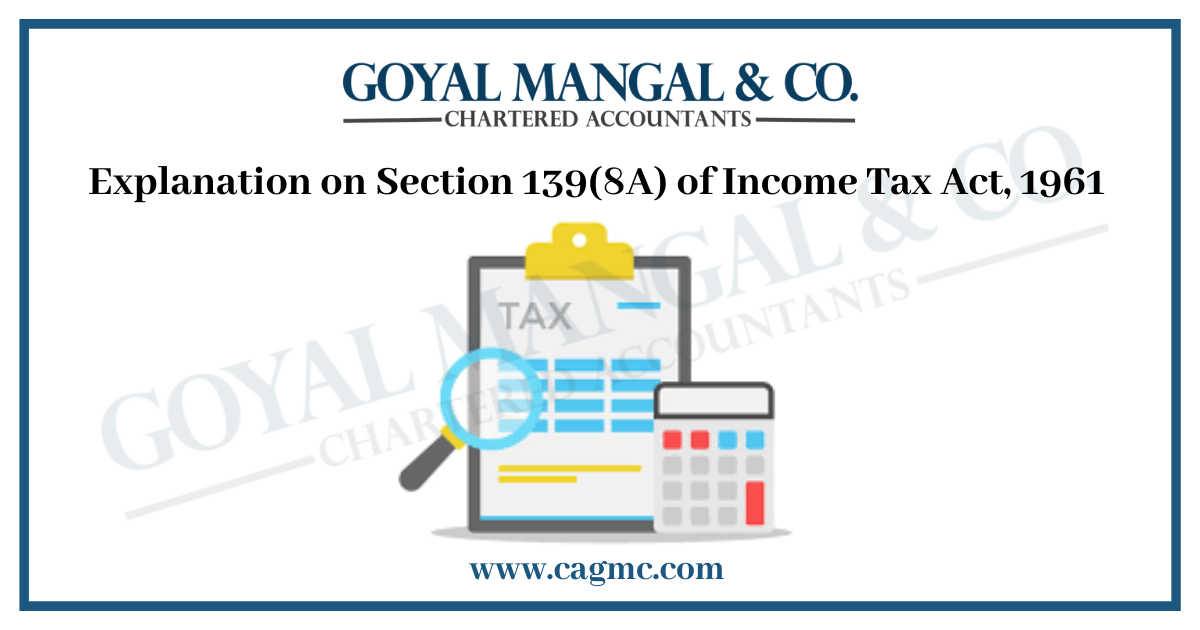
The Income Tax Act of 1961, contains various provisions related to the filing of income tax returns and assessment procedures. One such provision is Section 139(8A) which pertains to the rectification of mistakes in the tax return. Section 139(8A) of the Income Tax Act, 1961, was introduced by the Finance Act, 2020, and came into effect on 1st April 2020. This section enables taxpayers to rectify mistakes in their income tax returns filed under Section 139(1) or Section 139(4) within the time limit specified under Section 139(5).
In this article, we will discuss the explanation of Section 139(8A) of the Income Tax Act of 1961.
What is Section 139(8A) of the Income Tax Act, 1961?
According to Section 139(8A) of the Income Tax Act, a taxpayer who filed an original return according to Section 139(1), a revised return according to Section 139(5), a delayed return according to Section 139(4), or did not file an ITR at all may file an ITR-U.
The taxpayer cannot file Updated ITR in the following cases:
- Report a loss
- The updated tax return reduces the total tax liability previously declared
- An updated refund will cause a refund or increase a refund previously claimed
- If a search or investigation has been initiated against the taxpayer, the books or assets have been seized by the tax authority, or there is any proceeding or prosecution against the taxpayer.
- If the taxable income is less than INR 2, 50,000 (i.e. below the basic exemption limit).
- If the additional tax liability is NIL.
Thus, the taxpayer can file an Updated Return to declare the income which he did not declare in the ITR earlier and is ready to pay the same. The Updated ITR can be filed only once. This return cannot be revised.
Cases when rectification can be done under Section 139 (8A) of the Income Tax Act, 1961
Under this section, a taxpayer can rectify the mistake in the return of income, which is apparent from the record, by filing a revised return of income. The rectification can be done in the following cases:
- If any income chargeable to tax has been left out from the return of income filed earlier
- If any incorrect claim of deduction, exemption, or loss is made in the return of income filed earlier
- If any incorrect statement is made in the return of income filed earlier
It is important to note that rectification under Section 139(8A) can only be done if the mistake is apparent from the record. This means that the mistake should be evident from the information available with the Income Tax Department. For example, if a taxpayer has claimed a deduction for a donation, but the donation receipt is missing, it cannot be rectified under this section as the mistake is not apparent from the record.
Who can file ITR-U?
Any person who made a mistake or omitted certain income information in one of the following returns can file an updated return:
- Original income return, or
- Delayed return, or
- Revised return
An updated tax return can be submitted in the following cases:
- They didn’t file a return. Missed return filing deadline and late return deadline
- Income is not reported correctly
- You have selected the wrong income head
- Paid tax at the wrong rate
- To reduce the carry forward loss
- Reduce unabsorbed depreciation
- To reduce tax credit under section 115JB/115JC
- One can file only a single updated return for each Assessment Year (AY).
What is the due date for filing an updated return i.e. ITR-U?
Within 24 months from the end of the relevant assessment year, the taxpayer can file the updated DPPO according to Section 139 (8A) of the Income Tax Act. In its notification, CBDT states that taxpayers can file updated ITRs from AY 2020-21. The taxpayer can file an Updated ITR u/s 139(8A) after the due date for filing late ITR u/s 139(4) or a Revised ITR u/s 139(5). An instance can be taken-For AY 2022-23, the deadline for filing a late return has already passed (i.e., December 31, 2022). So from 1st January 2023, ITR-U can be filed for this AY and the last date to file the same is 31st March 2025.
Required details to be filled in the ITR-U form
Form ITR-U is introduced for filing updated returns under Section 139(8A). Below are the details for filing Form ITR-U apart from general information. The first is to ensure that you are eligible to file an updated return under the rules and regulations set out in the first, second, and third proviso to section 139 (8A).
Secondly, you need to choose the appropriate ITR form like ITR-1, 2, 3, 4, 5, and 6 for filing updated returns. Third, select the reasons for updating income. Select the period during which you file the updated return 1 year from the end of the appropriate assessment year.
Rectification of updated returns
The updated returns can only be rectified or corrected through a Digital Signature Certificate for tax audit and submission of returns by a political party. An option is a verification via an Electronic Verification Code (EVC), which is given for non-tax control cases.
Final words
In conclusion, Section 139(8A) of the Income Tax Act, 1961, provides a provision for taxpayers to rectify mistakes in their income tax returns filed under Section 139(1) or Section 139(4) within the time limit specified under Section 139(5). However, it is important to ensure that the mistake is apparent from the record and that the revised return is filed within the specified time limit to avoid penalties.
[/column]


